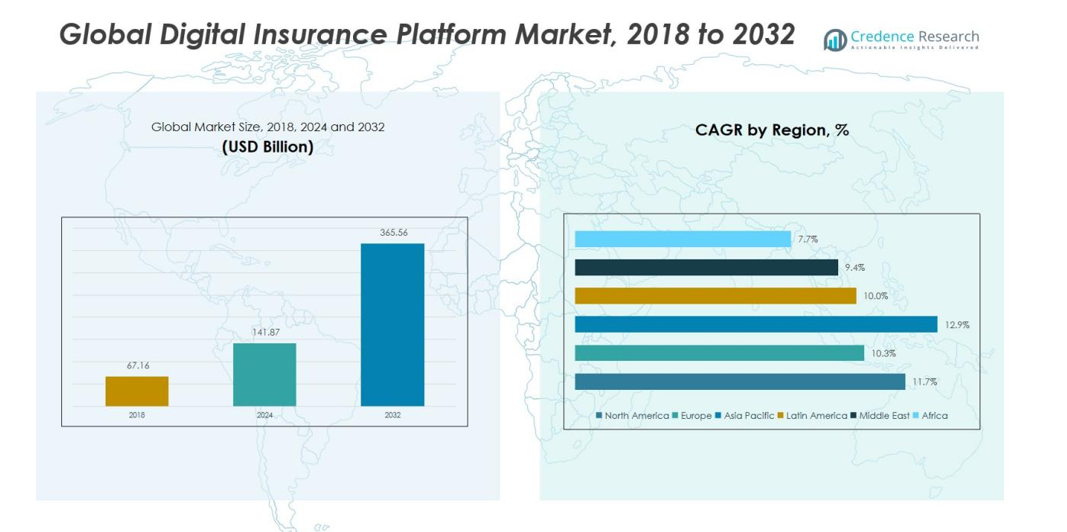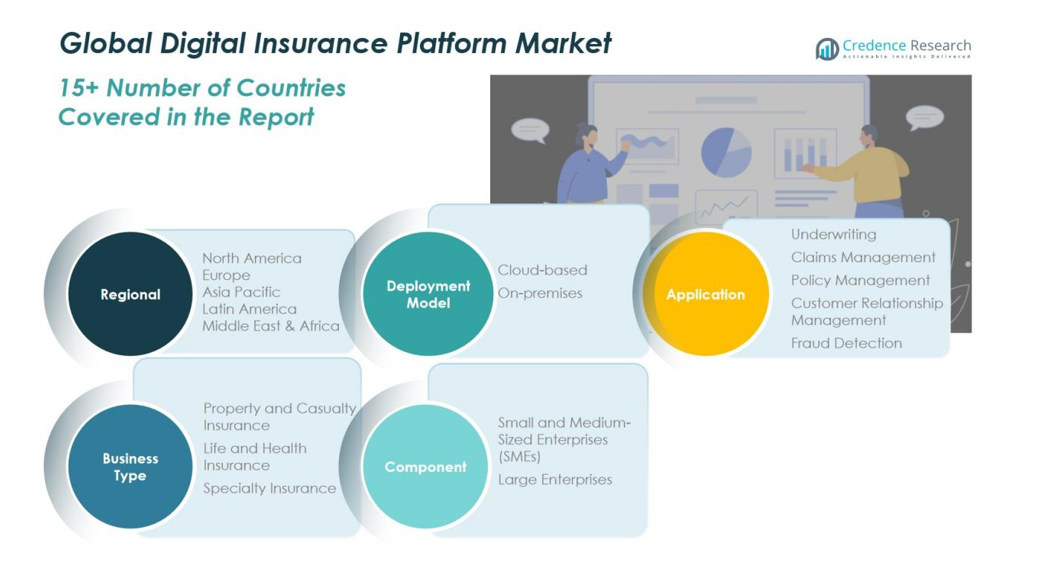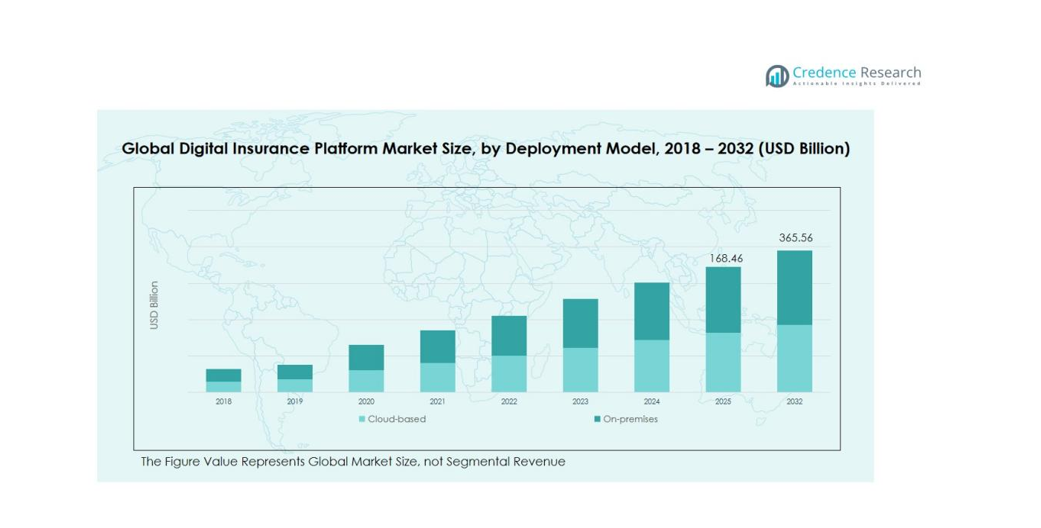CHAPTER NO. 1: GENESIS OF THE MARKET
1.1 Market Prelude – Introduction & Scope
1.2 The Big Picture – Objectives & Vision
1.3 Strategic Edge – Unique Value Proposition
1.4 Stakeholder Compass – Key Beneficiaries
CHAPTER NO. 2: EXECUTIVE LENS
2.1 Pulse of the Industry – Market Snapshot
2.2 Growth Arc – Revenue Projections (USD Billion)
2.3. Premium Insights – Based on Primary Interviews
CHAPTER NO. 3: DIGITAL INSURANCE PLATFORM MARKET FORCES & INDUSTRY PULSE
3.1 Foundations of Change – Market Overview
3.2 Catalysts of Expansion – Key Market Drivers
3.2.1 Momentum Boosters – Growth Triggers
3.2.2 Innovation Fuel – Disruptive Technologies
3.3 Headwinds & Crosswinds – Market Restraints
3.3.1 Regulatory Tides – Compliance Challenges
3.3.2 Economic Frictions – Inflationary Pressures
3.4 Untapped Horizons – Growth Potential & Opportunities
3.5 Strategic Navigation – Industry Frameworks
3.5.1 Market Equilibrium – Porter’s Five Forces
3.5.2 Ecosystem Dynamics – Value Chain Analysis
3.5.3 Macro Forces – PESTEL Breakdown
3.6 Price Trend Analysis
3.6.1 Regional Price Trend
3.6.2 Price Trend by Product
CHAPTER NO. 4: KEY INVESTMENT EPICENTER
4.1 Regional Goldmines – High-Growth Geographies
4.2 Product Frontiers – Lucrative Product Categories
4.3 Application Sweet Spots – Emerging Demand Segments
CHAPTER NO. 5: REVENUE TRAJECTORY & WEALTH MAPPING
5.1 Momentum Metrics – Forecast & Growth Curves
5.2 Regional Revenue Footprint – Market Share Insights
5.3 Segmental Wealth Flow – Deployment Model & Business Type Revenue
CHAPTER NO. 6: TRADE & COMMERCE ANALYSIS
6.1. Import Analysis by Region
6.1.1. Global Digital Insurance Platform Market Import Revenue By Region
6.2. Export Analysis by Region
6.2.1. Global Digital Insurance Platform Market Export Revenue By Region
CHAPTER NO. 7: COMPETITION ANALYSIS
7.1. Company Market Share Analysis
7.1.1. Global Digital Insurance Platform Market: Company Market Share
7.2. Global Digital Insurance Platform Market Company Revenue Market Share
7.3. Strategic Developments
7.3.1. Acquisitions & Mergers
7.3.2. New Product Launch
7.3.3. Regional Expansion
7.4. Competitive Dashboard
7.5. Company Assessment Metrics, 2024
CHAPTER NO. 8: DIGITAL INSURANCE PLATFORM MARKET – BY DEPLOYMENT MODEL SEGMENT ANALYSIS
8.1. Digital Insurance Platform Market Overview by Deployment Model Segment
8.1.1. Digital Insurance Platform Market Revenue Share By Deployment Model
8.2. Cloud-based
8.3. On-premises
CHAPTER NO. 9: DIGITAL INSURANCE PLATFORM MARKET – BY APPLICATION SEGMENT ANALYSIS
9.1. Digital Insurance Platform Market Overview by Application Segment
9.1.1. Digital Insurance Platform Market Revenue Share By Application
9.2. Underwriting
9.3. Claims Management
9.4. Policy Management
9.5. Customer Relationship Management
9.6. Fraud Detection
CHAPTER NO. 10: DIGITAL INSURANCE PLATFORM MARKET – BY BUSINESS TYPE SEGMENT ANALYSIS
10.1. Digital Insurance Platform Market Overview by Business Type Segment
10.1.1. Digital Insurance Platform Market Revenue Share By Business Type
10.2. Property and Casualty Insurance
10.3. Life and Health Insurance
10.4. Specialty Insurance
CHAPTER NO. 11: DIGITAL INSURANCE PLATFORM MARKET – BY ORGANIZATION SIZE SEGMENT ANALYSIS
11.1. Digital Insurance Platform Market Overview by Organization Size Segment
11.1.1. Digital Insurance Platform Market Revenue Share By Organization Size
11.2. Small and Medium-Sized Enterprises (SMEs)
11.3. Large Enterprises
CHAPTER NO. 12: DIGITAL INSURANCE PLATFORM MARKET – REGIONAL ANALYSIS
12.1. Digital Insurance Platform Market Overview by Region Segment
12.1.1. Global Digital Insurance Platform Market Revenue Share By Region
12.1.2. Regions
12.1.3. Global Digital Insurance Platform Market Revenue By Region
12.1.4. Deployment Model
12.1.5. Global Digital Insurance Platform Market Revenue By Deployment Model
12.1.6. Application
12.1.7. Global Digital Insurance Platform Market Revenue By Application
12.1.8. Business Type
12.1.9. Global Digital Insurance Platform Market Revenue By Business Type
12.1.10. Organization Size
12.1.11. Global Digital Insurance Platform Market Revenue By Organization Size
CHAPTER NO. 13: NORTH AMERICA DIGITAL INSURANCE PLATFORM MARKET – COUNTRY ANALYSIS
13.1. North America Digital Insurance Platform Market Overview by Country Segment
13.1.1. North America Digital Insurance Platform Market Revenue Share By Region
13.2. North America
13.2.1. North America Digital Insurance Platform Market Revenue By Country
13.2.2. Deployment Model
13.2.3. North America Digital Insurance Platform Market Revenue By Deployment Model
13.2.4. Application
13.2.5. North America Digital Insurance Platform Market Revenue By Application
13.2.6. Business Type
13.2.7. North America Digital Insurance Platform Market Revenue By Business Type
13.2.8. Organization Size
13.2.9. North America Digital Insurance Platform Market Revenue By Organization Size
13.3. U.S.
13.4. Canada
13.5. Mexico
CHAPTER NO. 14: EUROPE DIGITAL INSURANCE PLATFORM MARKET – COUNTRY ANALYSIS
14.1. Europe Digital Insurance Platform Market Overview by Country Segment
14.1.1. Europe Digital Insurance Platform Market Revenue Share By Region
14.2. Europe
14.2.1. Europe Digital Insurance Platform Market Revenue By Country
14.2.2. Deployment Model
14.2.3. Europe Digital Insurance Platform Market Revenue By Deployment Model
14.2.4. Application
14.2.5. Europe Digital Insurance Platform Market Revenue By Application
14.2.6. Business Type
14.2.7. Europe Digital Insurance Platform Market Revenue By Business Type
14.2.8. Organization Size
14.2.9. Europe Digital Insurance Platform Market Revenue By Organization Size
14.3. UK
14.4. France
14.5. Germany
14.6. Italy
14.7. Spain
14.8. Russia
14.9. Rest of Europe
CHAPTER NO. 15: ASIA PACIFIC DIGITAL INSURANCE PLATFORM MARKET – COUNTRY ANALYSIS
15.1. Asia Pacific Digital Insurance Platform Market Overview by Country Segment
15.1.1. Asia Pacific Digital Insurance Platform Market Revenue Share By Region
15.2. Asia Pacific
15.2.1. Asia Pacific Digital Insurance Platform Market Revenue By Country
15.2.2. Deployment Model
15.2.3. Asia Pacific Digital Insurance Platform Market Revenue By Deployment Model
15.2.4. Application
15.2.5. Asia Pacific Digital Insurance Platform Market Revenue By Application
15.2.6. Business Type
15.2.7. Asia Pacific Digital Insurance Platform Market Revenue By Business Type
15.2.8. Organization Size
15.2.9. Asia Pacific Digital Insurance Platform Market Revenue By Organization Size
15.3. China
15.4. Japan
15.5. South Korea
15.6. India
15.7. Australia
15.8. Southeast Asia
15.9. Rest of Asia Pacific
CHAPTER NO. 16: LATIN AMERICA DIGITAL INSURANCE PLATFORM MARKET – COUNTRY ANALYSIS
16.1. Latin America Digital Insurance Platform Market Overview by Country Segment
16.1.1. Latin America Digital Insurance Platform Market Revenue Share By Region
16.2. Latin America
16.2.1. Latin America Digital Insurance Platform Market Revenue By Country
16.2.2. Deployment Model
16.2.3. Latin America Digital Insurance Platform Market Revenue By Deployment Model
16.2.4. Application
16.2.5. Latin America Digital Insurance Platform Market Revenue By Application
16.2.6. Business Type
16.2.7. Latin America Digital Insurance Platform Market Revenue By Business Type
16.2.8. Organization Size
16.2.9. Latin America Digital Insurance Platform Market Revenue By Organization Size
16.3. Brazil
16.4. Argentina
16.5. Rest of Latin America
CHAPTER NO. 17: MIDDLE EAST DIGITAL INSURANCE PLATFORM MARKET – COUNTRY ANALYSIS
17.1. Middle East Digital Insurance Platform Market Overview by Country Segment
17.1.1. Middle East Digital Insurance Platform Market Revenue Share By Region
17.2. Middle East
17.2.1. Middle East Digital Insurance Platform Market Revenue By Country
17.2.2. Deployment Model
17.2.3. Middle East Digital Insurance Platform Market Revenue By Deployment Model
17.2.4. Application
17.2.5. Middle East Digital Insurance Platform Market Revenue By Application
17.2.6. Business Type
17.2.7. Middle East Digital Insurance Platform Market Revenue By Business Type
17.2.8. Organization Size
17.2.9. Middle East Digital Insurance Platform Market Revenue By Organization Size
17.3. GCC Countries
17.4. Israel
17.5. Turkey
17.6. Rest of Middle East
CHAPTER NO. 18: AFRICA DIGITAL INSURANCE PLATFORM MARKET – COUNTRY ANALYSIS
18.1. Africa Digital Insurance Platform Market Overview by Country Segment
18.1.1. Africa Digital Insurance Platform Market Revenue Share By Region
18.2. Africa
18.2.1. Africa Digital Insurance Platform Market Revenue By Country
18.2.2. Deployment Model
18.2.3. Africa Digital Insurance Platform Market Revenue By Deployment Model
18.2.4. Application
18.2.5. Africa Digital Insurance Platform Market Revenue By Application
18.2.6. Business Type
18.2.7. Africa Digital Insurance Platform Market Revenue By Business Type
18.2.8. Organization Size
18.2.9. Africa Digital Insurance Platform Market Revenue By Organization Size
18.3. South Africa
18.4. Egypt
18.5. Rest of Africa
CHAPTER NO. 19: COMPANY PROFILES
19.1. IBM Corporation
19.1.1. Company Overview
19.1.2. Product Portfolio
19.1.3. Financial Overview
19.1.4. Recent Developments
19.1.5. Growth Strategy
19.1.6. SWOT Analysis
19.2. Guidewire Software
19.3. Microsoft Corporation
19.4. Duck Creek Technologies
19.5. Oracle Corporation
19.6. SAP SE
19.7. Next Insurance
19.8. Company 8
19.9. Company 9
19.10. Company 10






